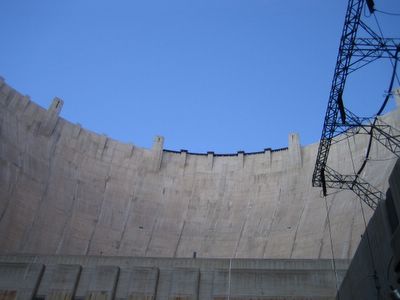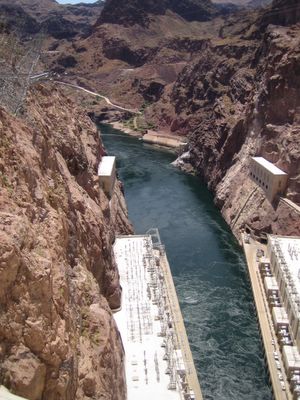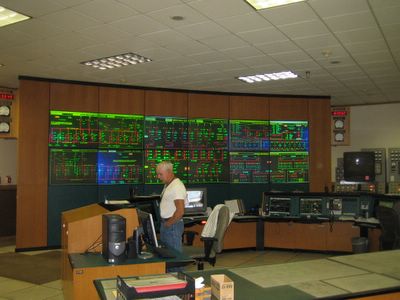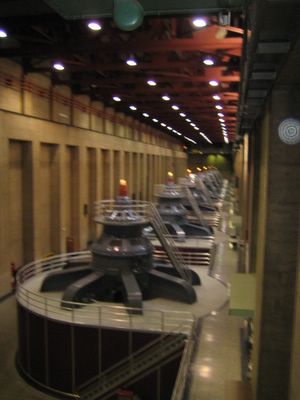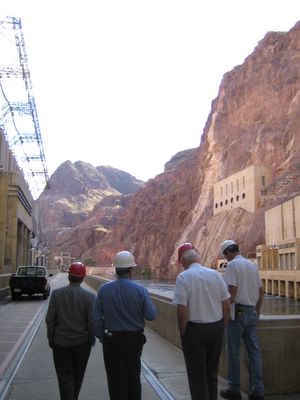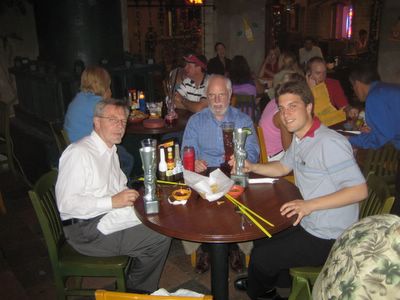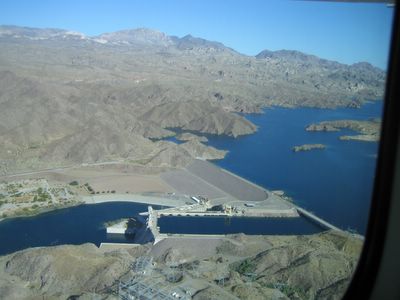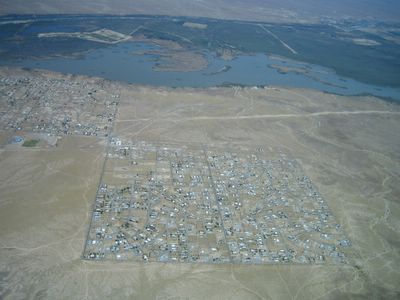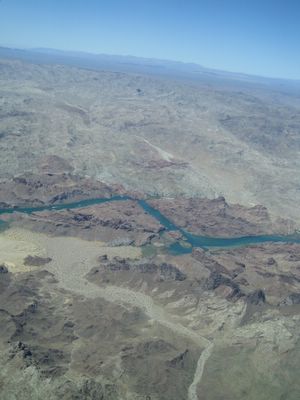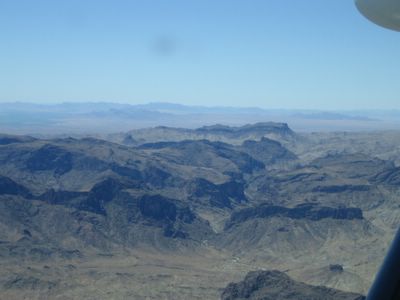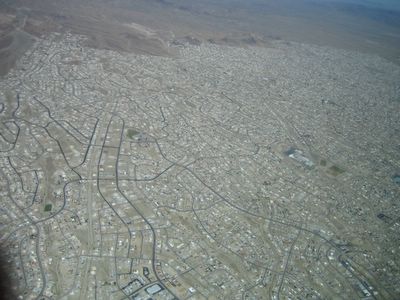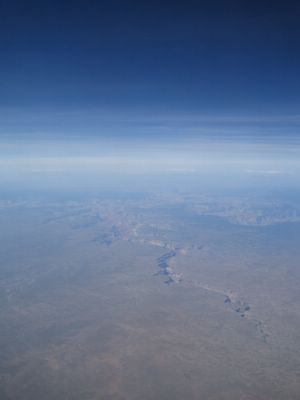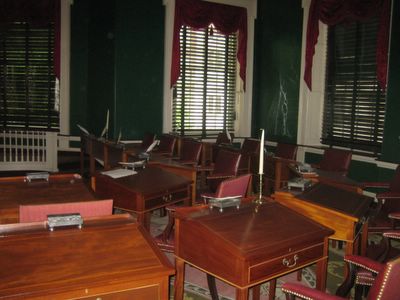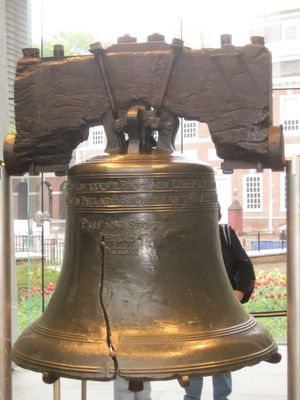Tuesday, May 24, 2005
The Money Factory
"In the last few minutes, I just printed my lifetime earnings." And literally, they did. How depressing!
The National Academies are doing a study on technologies to stay ahead of counterfeiters. The task asks that the committee comes up with future threats, and with technologies that could be incorporated in the banknotes. Funnily enough, they wouldn't tell us what was in the bill. The secret service is in charge of protecting the banknote; we were briefed by them, but since the meeting was open to the public (National Geographic and Nature came along), they wouldn't tell us what people are not meant to know. They will in a later meeting, closed to the public.
Still walking around the production floor, and talking the the workers, I learned a lot more than they officially wanted us to know. I won't write it down here because Americans are a little crazy when it comes to security. Someone that shouln't may read this.
The Secret Service told us about counterfeiting. Interestingly, counterfeiting has moved from big presses in secret locations, to the home; that's right, the home, yours or mine. Go buy some paper with cotton in it, scan the note, print it x times and there you go, you have a crude banknote that works pretty often. And all this on your home computer, and your all in one system. This type of counterfeiting is growing simply because the opportunity is there.
I learned much more, but I won't put it in here; it can make great dinner conversation.
I'll leave you with a very interesting thread from horizons unlimited. This thread asks people how they can afford their trips. Well, most can't but they do anyway, and they tell you why:
http://www.horizonsunlimited.com/ubb/Forum1/HTML/000409.html
Saturday, May 21, 2005
Mama Mia
I am continuing my research on the Africa trip; it is very exciting. There is so much to know. I bought the adventure motorcycling handbook, a great read, very informational. New problem: James has been planning to go to Sweden to do some farming for nine months from march 06, which clashes with this trip. I tried to talk him out of it, but if you know him, don't let him go to Sweden. Email him, pester him, harass him -- don't let him stray from the righteous path. Farming, gee. But at this stage I am not too worried; when he starts researching this trip, the appeal will be just too great.
I am posting a link to this website again, for those that haven't seen it. The pictures are very good. I would be going to the places in the latter half of his trip.
http://www.contrast.cx/welcome/
Monday, May 16, 2005
The value of dust
I have been researching universal health care for one of my classes. The
There are many proponents of universal health care in the country, but opponents are very good at kicking up dust. A privatised system allows more choice for the insured, and it means that you don't pay for other people's bad lifestyles. Other than that, there really isn't much of an advantage to the current system. These issues are mere dust when you look at the bigger picture: rising healthcare costs, patients that can't afford necessary treatment, the sick can't find insurance, etc.
But this dust is kicked up so well that American politicians are blinded and divided into party lines: republicans are against universal healthcare, democrats for. Republicans are in power, therefore healthcare will continue its downward spiral. Healthcare is not really on the agenda anyway; war and terror are what concerns Americans.
The best way to stop a process is to kick up dust. Not so long ago, the people were divided on slavery, racism and sexism. Now, far past the confusion of these eras, these practices are seen in a very negative light, regardless of party lines. If
And so it seems in every walk of life. Whenever a new idea comes forward, fear leads people to rationalise dust into boulders, and to expose it vehemently. Mathematician can cite risk and probabilities, but dust-kickers are expert statistic-bashers. I have seen it many times. I will give you data, you will cast doubt on it, and go back to kicking up dust, as if the data meant nothing. I see it when I go to congressional hearings. Data comes out, say on the Patriot Act, reporting abuses; opponents will ignore the facts, or if they can cast some doubt on it, and then will carry on kicking up dust, saying that the Act is very useful.
In democracies, dust-kickers rationalise their fears into small arguments, a process funded by sympathisers. Their role is frustrating but important: democracies are stable because they are slow. No one leader can change the system fast enough to achieve dictatorship if people keep on kicking up dust.
On the individual level, kicking dust makes less sense. One should take the time to consider arguments against one’s view, but one should give time for the dust to settle, and the vista to clear. After all, life is too short to be run democratically.
Saturday, May 14, 2005
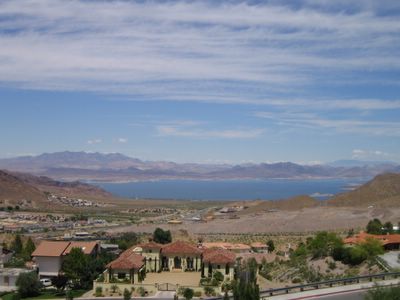
Here I am in Boulder City near Vegas. My hotel is in Vegas, but this is where work is taking me. The National Academies is conducting a study for the Bureau of Reclamation. The Bureau runs some 355 dams it built over the course of a century in the West. Without the Bureau, the West would be arrid. We are trying to see how the Bureau could better manage itself, especially its facilities. Its role has changed from that of a dam builder to that of a dam manager. But this region we are visiting is very well run. Not much to say against them. Still, we sat with the regional top management, and then with the area managers. We visited a series of dams, including one you may have heard of. Listening at first, and asking questions later, I learned a lot about management, and problems people have to deal with.
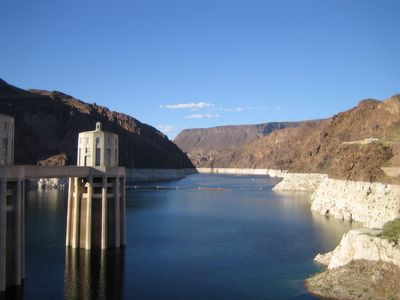
The white line is where the water is meant to be. For the first time ever, Hoover is planning shortages of water. By what is termed the 'law of the river', the Bureau of Reclamation has to deliver a certain amount of water to seven states and Mexico. Water is the lifeblood of the region, but it is not raining enough.
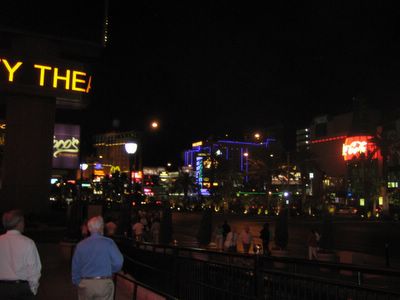
The strip. If you have seen movies of Las Vegas, this is what you have seen. Around the strip, there is little of interest besides Hoover Dam. Vegas is a suburban town, and horror, it is flat. But the strip is something unique. Whereas LA is the where people pursue the dream, here they sell it. A lot healthier I would say. Sex is branded erotic, entertainement is entertainement, greed is the hope of winning. Sin City markets itself for what it is. Congratulations.

Behind me is a generator under repair. Water comes in via the pennstock into the scroll case (which I examined). It is then let in by opening wickets (like a venitian blind), and turns a wheel, which in turns rotates a shaft, which turns a set of magnets past a coil of windings. I am standing at the top of it all. The windings are just below, and underneath it all is the scrollcase. It was an intersting visit.
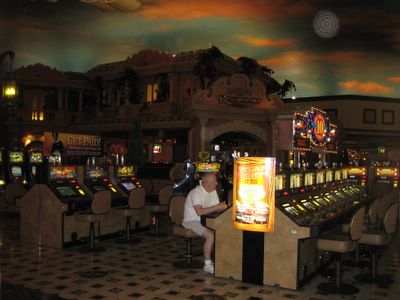
Gambling on the slot machines is fun, especially when you can get paid without getting up (see the sign on the empty row). At all times of the day, people, looking very bored, stare at a screen and press a button. The typical profile is of someone older, possibly retired, usually female, a little fat, dressed in Target clothes. Forget the glamour. Casinos know where the money is, and it is not in the small and select group of high rollers.
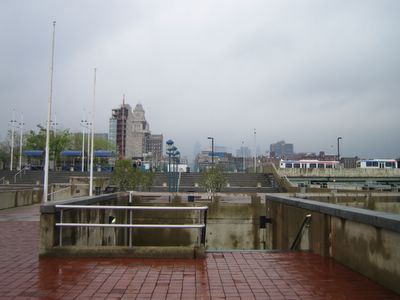
Two weekends ago, I went to Philadelphia. Philly has a very long history by American standards. This is where the whole liberation movement started. The declaration of independence, the constitution, and the bill of rights were all drafted here. These documents occupy a very important place in the American culture.
Tuesday, May 10, 2005
Vegas, here I come
I am helping on a study for the Bureau of Reclamation. It is rather nice, I must say. Wish me luck.
Wednesday, May 04, 2005
2 threads
I am asking the hard questions, the one I get from some of you. If you want to see their answers check them out:
Thorn tree -- lots of traffic
Horizons Unlimited -- People who have done it or are thinking of doing it.
Tuesday, May 03, 2005
Websites and Info
http://www.gooseontheloose.com/ -- this couple travelled pretty much everywhere on an overloaded motorcycle.
http://www.adventure-motorcycling.com/ -- I still have to buy his book, but this guy seems to be the reference around the community.
http://www.horizonsunlimited.com/ubb/Forum28/HTML/000265.html -- relatively recent post on the crossing Sudan. Sudan is the only country I need to cross that has some form of civil unrest. Unless I go West past the Congos.
